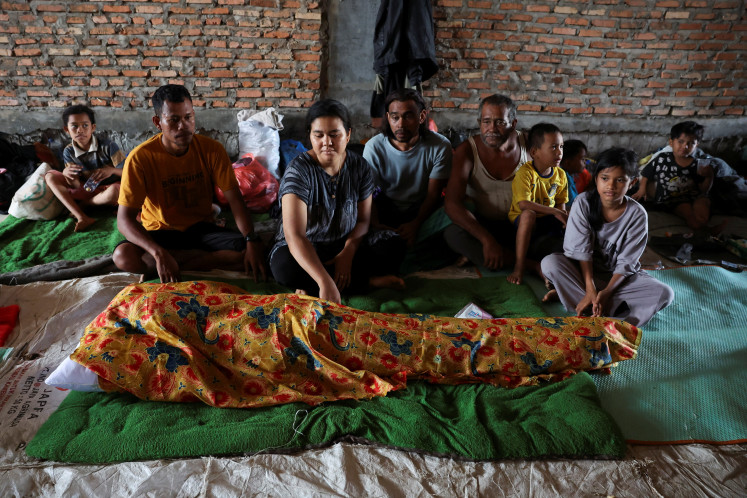Popular Reads
Top Results
Can't find what you're looking for?
View all search resultsPopular Reads
Top Results
Can't find what you're looking for?
View all search resultsSonless sultan moves to make daughter his successor
In an apparent effort to protect the bloodline of the kraton (royal palace), Sultan Hamengkubuwono X of the Yogyakarta customary sultanate testified before the Constitutional Court (MK) on Thursday in favor of the plaintiff who is challenging a “discriminative” provision of a Yogyakarta law
Change text size
Gift Premium Articles
to Anyone
I
n an apparent effort to protect the bloodline of the kraton (royal palace), Sultan Hamengkubuwono X of the Yogyakarta customary sultanate testified before the Constitutional Court (MK) on Thursday in favor of the plaintiff who is challenging a “discriminative” provision of a Yogyakarta law.
The judicial review was filed by eleven Yogyakartan petitioners of various backgrounds, including the royal servants of the Yogyakarta Palace and women’s rights activists, who claimed that Article 18 point (m) of the 2012 law on Yogyakarta’s special status was “discriminatory against women”.
The article stipulates that governor and deputy governor candidates of Yogyakarta should submit a curriculum vitae that outlines, among other things, education records, occupation and the precense of siblings, wife and children to the Yogyakarta Provincial Legislative Council (DPRD).
The plaintiffs challenged the word “wife” as implying that only men can take the governor seat. This would also mean only the male lineage of the royal family can take the reign of the sultan. Under its special status, the sultan is also automatically the governor of Yogyakarta.
Before the court panel presided over by Justice Anwar Rusman, Hamengkubuwono said the article threatened the sovereignty of the palace and the sultan, which “reserved all rights to appoint whether its successor would be a man or woman from the royal blood family.”
“Matters related to the sultanate and its government can only be decided by the king, the sultan. The sultan reigns as the inherent power,” Hamengkubuwono said.
“In our stance, Article 18 (m) should be better phrased to only ‘submit a curriculum vitae’ without [the rest of the phrase],” he added.
Article 18 (c) states the governor and deputy governor candidates are the ruling Sultan of Yogyakarta and the Duke of the Pakualam principality, respectively.
Last year, the 70-year-old Hamengkubuwono, who became the sultan in March 1989, issued a sabdaraja (king’s proclamation), naming the eldest of his five daughters, Gusti Kanjeng Ratu (GKR) Mangkubumi, as the crown princess.
Observers viewed that the sultan’s decision was made to make way for Mangkubumi to become the sultan’s heir and successor to the royal bloodline, as he had no sons.
Yogyakartans have criticized the move, saying that the sultan was a position suitable only for males as it was part of tradition of the Javanese Palace.
It is believed that, under Yogyakarta Sultanate tradition, if the sultan has no sons, his successor would be his younger brother.
Hamengkubuwono, who has five daughters, also has 13 brothers and five sisters.
Regional Representatives Council (DPD) member Nono Sampono said that allowing a female to take the reign of the palace could hamper the sultanate’s centuries-held tradition, which adhered to patriarchal principles.
Justice Patrialis Akbar questioned the sultan on his knowledge of Article 18 (m) during the drafting of the law before it was passed in 2012.
Margarito Kamis, a law expert who testified before the court under request of the plaintiffs, said the provision allowed no room for the sultan’s daughter to take the reign.
In Indonesia, the phrase “wife” was appointed to someone belonging to a man, Margarito said, adding that the law could endanger the palace’s existence in the future.
“It’s like the central government was trying to hamper the sultan’s daughter to become the successor since they already know the sultan does not have sons. From an ethical perspective, the political move was not elegant and from a constitutional perspective, it was unconstitutional,” he added.










